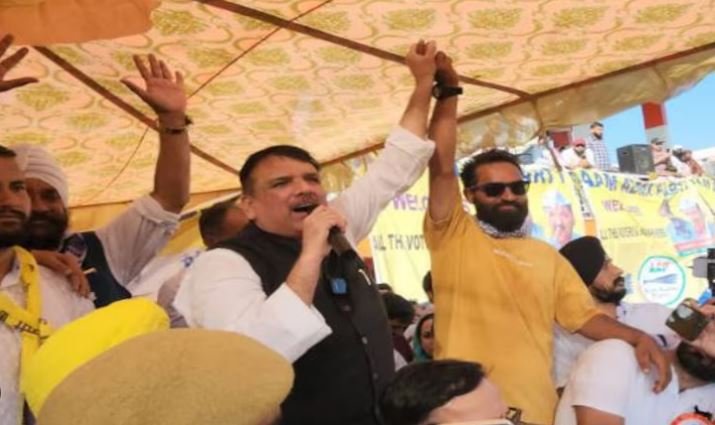AAP’s Mehraj Malik Makes History in Doda, Secures Party’s First Win in Jammu & Kashmir Assembly
Political Upset in Doda: Mehraj Malik Paves Way for AAP’s Entry into J&K Legislature
JAMMU, Oct 8: In the recent Jammu and Kashmir Legislative Assembly elections, Mehraj Malik’s victory from the Doda constituency marked a historic milestone for the Aam Aadmi Party (AAP) as it successfully opened its account in the region. Malik, a 36-year-old politician hailing from Thathri in Doda, achieved this by defeating BJP candidate Gajay Singh Rana and other political heavyweights, including a former minister and a former MLA. This win holds significant importance as it establishes AAP’s presence in Jammu and Kashmir, the fifth state in which the party has secured a legislative seat after Delhi, Punjab, Goa, and Gujarat.
Following his victory, AAP leader and former Delhi Chief Minister Arvind Kejriwal expressed his congratulations on social media platform X (formerly Twitter). Kejriwal praised Malik’s performance and announced his intention to participate in an event in Doda on October 10, accepting Malik’s invitation through a video call. In his message, Kejriwal wrote in Hindi, “Many congratulations on the grand victory of AAP candidate from Doda, Mehraj Malik, against the BJP. You fought the election very well. Congratulations to the entire party for having an MLA in the fifth state.”
Despite AAP’s triumph in Doda, several Jammu-based and national parties faced significant setbacks in these elections. Parties like the Jammu and Kashmir National Panthers Party (India), Jammu and Kashmir National Panthers Party (Bhim), Democratic Progressive Azad Party (DPAP), Bahujan Samaj Party (BSP), Azad Samaj Party (Kanshi Ram), Shiv Sena (UBT), and other smaller political outfits failed to win any seats. In contrast, Malik’s win was secured by a margin of 4,538 votes, where he garnered 23,228 votes against the BJP’s 18,690. Other significant contenders included Khalid Najib Suharwardy of the JKNC, who received 13,334 votes, and Abdul Majid Wani of the DPAP, who polled 10,027 votes.
Malik’s victory also gains significance as he defeated high-profile candidates without significant support from senior AAP leaders, except for a rally conducted by AAP MP Sanjay Singh. His campaign demonstrated the grassroots strength of the party’s approach in regions beyond its traditional strongholds. Notably, Malik’s past political engagements include his success in the District Development Council (DDC) elections in 2010 and his candidacy in the 2024 Parliamentary elections from the Udhampur Lok Sabha segment, where he finished as the third runner-up.
The 2024 J&K Assembly elections also highlighted the struggles of long-established parties like the Jammu and Kashmir National Panthers Party (JKNPP), which failed to regain its traditional stronghold in Udhampur. Despite fielding candidates in all seats, prominent figures like Harsh Dev Singh and Ashri Devi could not secure victories. The Democratic Progressive Azad Party (DPAP), led by Ghulam Nabi Azad, also struggled to make an impact, with its candidates, including former minister Abdul Majid Wani, failing to secure seats.
Furthermore, the Bahujan Samaj Party (BSP), which once held a notable presence in the 1996 J&K Assembly with four MLAs, also failed to secure a seat. The Azad Samaj Party (Kanshi Ram), led by Chandrashekhar Azad Ravan, and other regional outfits like Shiv Sena (UBT), Janta Dal (United), and smaller parties such as the Sainik Samaj Party, NDPI, Haq Insaf Party, and Hindustan Shakti Sena also saw no success in opening their accounts.
Overall, the election results illustrate a significant shift in Jammu and Kashmir’s political landscape, with AAP emerging as a notable player in the region. Mehraj Malik’s victory not only signifies the expansion of AAP’s influence beyond its traditional bases but also underscores the challenges faced by established regional and national parties in the post-abrogation political scenario of Jammu and Kashmir.




